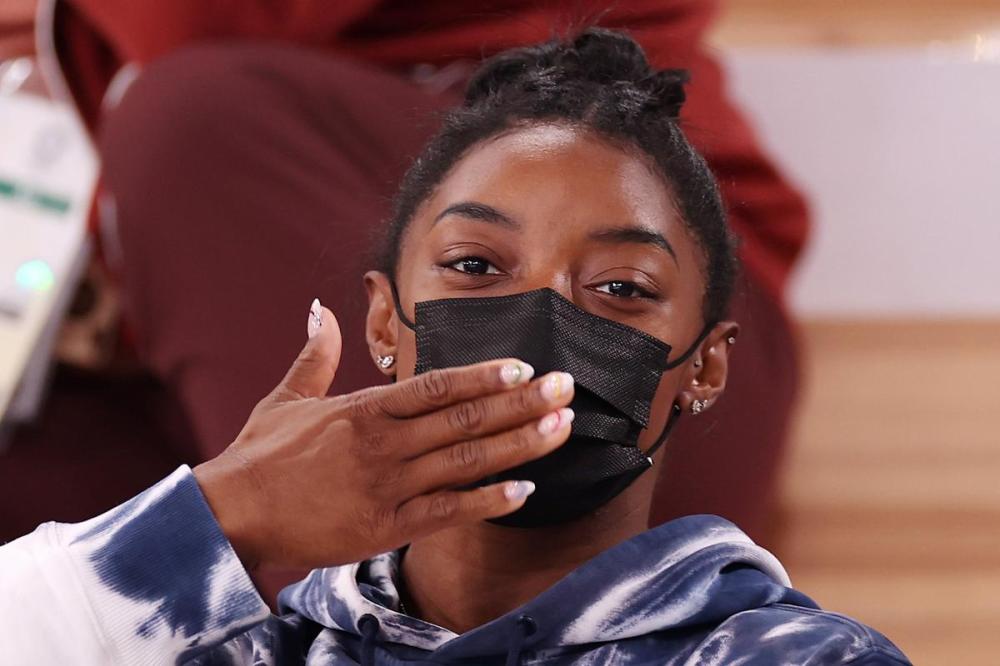Simone Biles was not inevitable, and that should make what she’s done bigger
Advertisement
Read this article for free:
or
Already have an account? Log in here »
To continue reading, please subscribe:
Monthly Digital Subscription
$0 for the first 4 weeks*
- Enjoy unlimited reading on winnipegfreepress.com
- Read the E-Edition, our digital replica newspaper
- Access News Break, our award-winning app
- Play interactive puzzles
*No charge for 4 weeks then price increases to the regular rate of $19.00 plus GST every four weeks. Offer available to new and qualified returning subscribers only. Cancel any time.
Monthly Digital Subscription
$4.75/week*
- Enjoy unlimited reading on winnipegfreepress.com
- Read the E-Edition, our digital replica newspaper
- Access News Break, our award-winning app
- Play interactive puzzles
*Billed as $19 plus GST every four weeks. Cancel any time.
To continue reading, please subscribe:
Add Free Press access to your Brandon Sun subscription for only an additional
$1 for the first 4 weeks*
*Your next subscription payment will increase by $1.00 and you will be charged $16.99 plus GST for four weeks. After four weeks, your payment will increase to $23.99 plus GST every four weeks.
Read unlimited articles for free today:
or
Already have an account? Log in here »
Hey there, time traveller!
This article was published 28/07/2021 (1599 days ago), so information in it may no longer be current.
“With the year that it’s been, I’m really not surprised how it played out.”
— Simone Biles, after pulling out of the team gymnastics competition before removing herself from the all-around competition, too, for mental health reasons.
TOKYO—You may not have heard of Jenny Rissveds. The Swedish mountain biker won the women’s cross-country gold in Rio in 2016 at 22, the youngest to do it. She finished 14th here. In the intervening four years two family members died, and she suffered from depression and an eating disorder. For a time, she stepped away from the sport.

“I’m just so f—ing happy that it’s over,” the 27-year-old told reporters after her event, as relayed by the Olympic News Service. “Not just the race today but all these years (since Rio 2016), to not have to carry that title any more. I have a name and I hope that I can be Jenny now and not the Olympic champion, because that is a heavy burden.
“I hope that I will be left alone now.”
Every Olympics is singular, and this one more than most. Beyond COVID, the empty venues, the heat, this is now the Olympics where Naomi Osaka faltered, and where Biles stepped away. Biles is the most incredible gymnast in history, and a strong and important voice on the failures of USA Gymnastics and the decades-long, monstrous Larry Nassar sexual abuse scandal. She’s more than great: she is important.
But Biles is sometimes mistaken for superhuman just because she can do things no human has ever been able to do. Until Tuesday night, when she couldn’t. When you attempt moves so kinetically dangerous that other gymnasts are told they should not even attempt them, trying to fly without a clear head could hurt you. Biles was losing herself in the air. It took a very specific kind of courage to walk away, from both the team competition — where she could have hurt her teammates as well as herself — and the all-around.
These are becoming the Games, as everyone is saying, of “It’s OK not to be OK.” Naomi Osaka had not spoken to the press since withdrawing from the French Open in May over media obligations, citing her mental health and anxiety, and she returned here but was protected before she lost, and admitted the pressure of being the torch-lighter got to her. Liz Cambage, the Australian giant who is one of the very best basketball players on the planet, declined to come, citing anxiety over the COVID restrictions that would keep her away from friends and family.
Of course, there are more. There are athletes here who will succeed while grappling with what Biles called demons. There will be athletes who falter and get lost in the great constant churn of the Olympics, and maybe they could have been better had they been OK. There are athletes who have struggled and fought their way through, and some of them probably shouldn’t have. Michael Phelps is here for NBC, and spoke eloquently about self-care in the wake of Biles withdrawing.
“We carry a lot of weight on our shoulders, and it’s challenging especially when we have the lights on us and all of these expectations being thrown on top of us,” he said on the broadcast.
Phelps, of course, was famous for swimming every day for four years on the way to unparalleled Olympic glory. And later, amid all kind of problems, he thought about killing himself.
This is a harder Games than most, a lonelier Games.
American superstar Katie Ledecky got emotional after her win in the first women’s 1,500-metre freestyle Wednesday, crying or biting back tears from race end to the press conference. She had also lost just the second race of her Olympic career earlier in the day, in the 200 freestyle; when you expect perfection, anything else is heavy. Biles spoke about the weight of perfection, as has Penny Oleksiak.
At one point Ledecky also said she was thinking about her grandparents, two of whom have died. When Canada’s Maude Charron won gold in the women’s 64-kilogram weightlifting, her tears came from the same place: she wished her family could have been here.
So yes, some people called Simone Biles weak, soft, whatever a schoolyard bully would say. Some people are the worst of us.
But mostly people seemed to understand. Biles has endured the trauma of sexual assault and a governing body that didn’t protect its athletes; she has fought through injuries; she lives in the hypertoxic social media age, where it is so much harder for anybody to hide. And that was before COVID compressed so many of us, a little or a lot, in ways that a lot of people probably haven’t been able to express yet. We may not even know.
Some athletes here are dominant, some are surprises, and almost all are just what happens when people throw their hearts onto a field of play. The Olympics bottle up the best stuff on the planet. It’s the grandest show there is.
But Simone Biles was not inevitable, and if anything that should make what she has done bigger. She was not inevitable despite six gold medals, or while transcending the limits of the sport, or when making gravity and physics bend to meet her halfway. She could still break, just as Michael Phelps could, just as Jenny Rissveds could, only to try to put themselves back together. She could lose herself while flying through the air.
But if you think this fails to live up to some imaginary stolen-valour competitive standard, then you are missing more than the value of taking care of yourself, and more than the importance of empathy. You’re missing the fact that if the greatest of all time is not inevitable, then nobody is inevitable. Every success could have been a failure, and some failures are truly successes. If you are missing that you are missing the central point of the Olympics, the best part, the important part.
It’s that we’re humans.
Bruce Arthur is a Toronto-based columnist for the Star. Follow him on Twitter: @bruce_arthur





